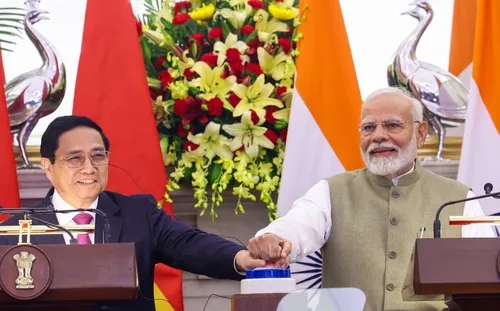Introduction
India and Vietnam, two nations with rich cultural histories and strategic geographical locations in Asia, have cultivated a relationship marked by mutual respect, cooperation, and shared interests. Over the years, the bond between these two countries has strengthened, evolving from a partnership based on historical ties to one that is now characterized by robust strategic, economic, and cultural collaborations. This essay delves into the various dimensions of the India-Vietnam relationship, exploring its historical roots, strategic significance, economic ties, and future prospects.
Table of Contents
Historical Context
The relationship between India and Vietnam dates back over two millennia, rooted in cultural and religious exchanges. The spread of Buddhism from India to Vietnam in the first and second centuries AD played a pivotal role in shaping Vietnam’s spiritual and cultural landscape. Indian monks and scholars traveled to Vietnam, bringing with them not only religious teachings but also knowledge in areas such as medicine, architecture, and art. This early exchange laid the foundation for a long-standing cultural affinity between the two nations.
Relationship
In the modern era, the relationship between India and Vietnam was significantly shaped by their shared experiences of colonialism and their struggles for independence. Both nations were inspired by the principles of non-alignment and anti-imperialism, which led to mutual support in their respective liberation movements. India’s first Prime Minister, Jawaharlal Nehru, and Vietnam’s founding leader, Ho Chi Minh, shared a close bond, further solidifying the friendship between the two nations.
Strategic and Political Relations
In recent decades, the strategic partnership between India and Vietnam has deepened significantly, driven by shared concerns over regional security, particularly in the Indo-Pacific region. The two countries have a common interest in maintaining peace, stability, and freedom of navigation in the South China Sea, a region of strategic importance where Vietnam has territorial disputes with China. India’s Act East Policy, which seeks to strengthen ties with Southeast Asia, and Vietnam’s policy of diversification and multilateralization of its foreign relations, have provided a strong foundation for their strategic cooperation.
The defense relationship between India and Vietnam has seen notable progress. India has been a key partner in enhancing Vietnam’s defense capabilities, offering training to Vietnamese military personnel and supplying critical defense equipment. In 2016, India extended a $500 million line of credit to Vietnam for defense procurement, further strengthening their military ties. Joint naval exercises, high-level defense dialogues, and collaboration in areas such as cyber security and maritime security are integral components of their strategic partnership.
Politically, India and Vietnam share a commitment to a rules-based international order and respect for international law, particularly in the context of maritime disputes. Both countries have been vocal supporters of each other in international forums, advocating for peaceful resolution of conflicts and opposing unilateral actions that could destabilize the region. This political alignment is further reinforced by regular high-level visits and bilateral agreements that span a wide range of sectors.
Economic Ties
Economic cooperation between India and Vietnam has grown steadily over the years, with trade and investment forming a crucial pillar of their bilateral relationship. Bilateral trade between the two countries has seen a significant increase, with both sides setting an ambitious target of $15 billion in trade by 2025. Key sectors driving this trade include agriculture, textiles, pharmaceuticals, and information technology.
India is among the top ten trading partners of Vietnam, and Vietnam is an important partner for India in the ASEAN region. Indian companies have made significant investments in Vietnam, particularly in sectors such as energy, mining, and manufacturing. The India-Vietnam Joint Sub-Commission on Trade, which meets regularly, plays a vital role in addressing trade barriers and exploring new avenues for economic cooperation.
In addition to bilateral trade, India and Vietnam are also collaborating on regional and multilateral platforms. Both countries are members of the Regional Comprehensive Economic Partnership (RCEP) and the ASEAN-India Free Trade Area (AIFTA), which provide frameworks for deeper economic integration. Their participation in these platforms underscores their commitment to a free and open Indo-Pacific, with economic cooperation at its core.
Cultural and Educational Exchanges
Cultural ties between India and Vietnam are deeply rooted in history, and these ties continue to flourish in contemporary times. The shared heritage of Buddhism has been a significant cultural link, with both countries celebrating this common legacy through cultural exchanges, joint research, and preservation of historical sites.
In recent years, there has been a renewed focus on promoting cultural diplomacy. Indian cultural festivals, film screenings, and art exhibitions are regularly organized in Vietnam, and vice versa. The Indian Council for Cultural Relations (ICCR) plays an active role in fostering cultural exchanges, while the Indian diaspora in Vietnam contributes to strengthening people-to-people ties.
Educational collaboration is another important aspect of the India-Vietnam relationship. India offers scholarships to Vietnamese students under the Indian Technical and Economic Cooperation (ITEC) program and other schemes, enabling them to pursue higher education in India. Additionally, academic exchanges, joint research projects, and partnerships between universities are helping to build stronger educational links between the two nations.
Future Prospects
As India and Vietnam look to the future, their relationship is poised to grow even stronger. The evolving geopolitical landscape in the Indo-Pacific region presents both challenges and opportunities for their partnership. As regional powers, India and Vietnam are likely to continue working closely on issues of mutual concern, such as maritime security, counterterrorism, and climate change.
Conclusion
The relationship between India and Vietnam is a testament to the enduring power of shared values, mutual respect, and strategic cooperation. From their historical ties rooted in cultural exchanges and anti-colonial solidarity to their contemporary partnership based on strategic, economic, and cultural collaboration, India and Vietnam have built a relationship that is both deep and multifaceted.








